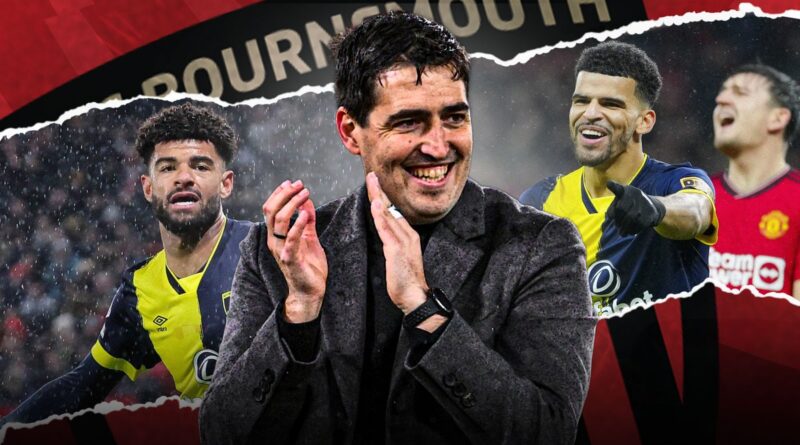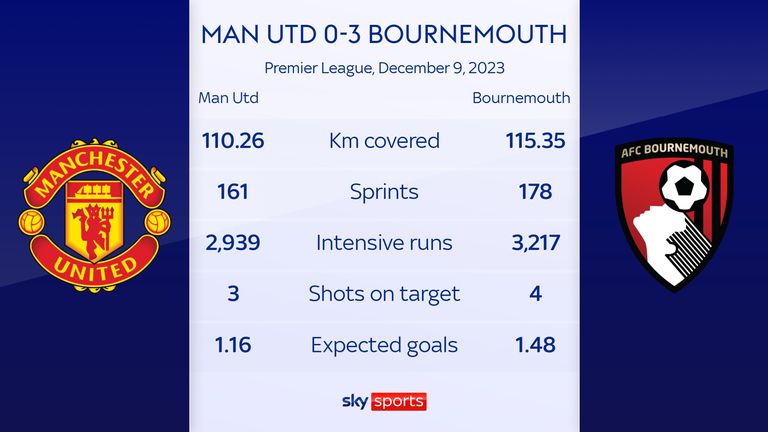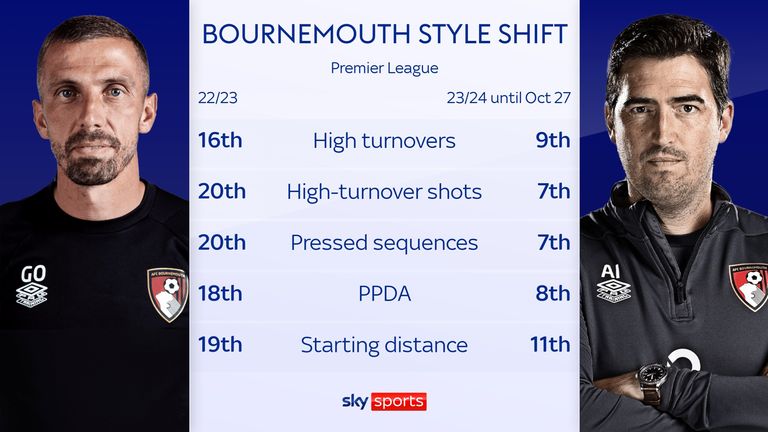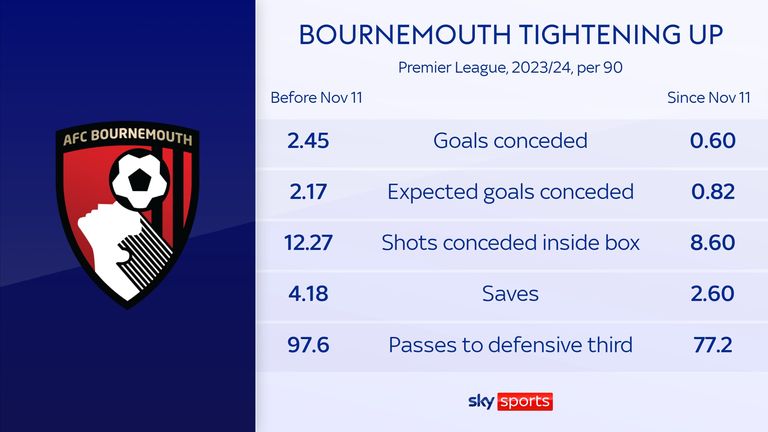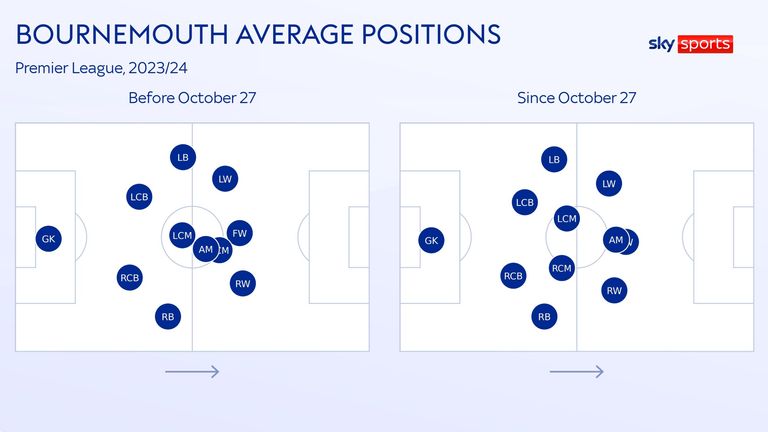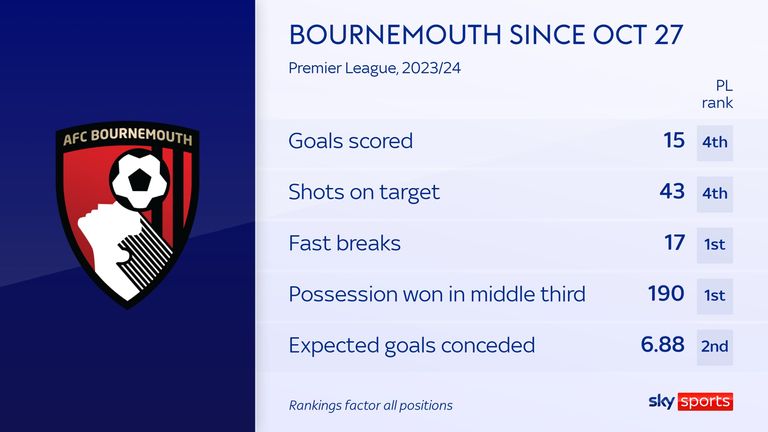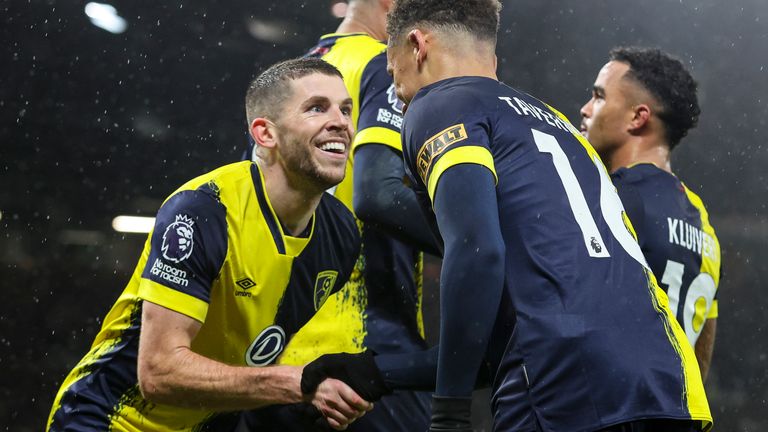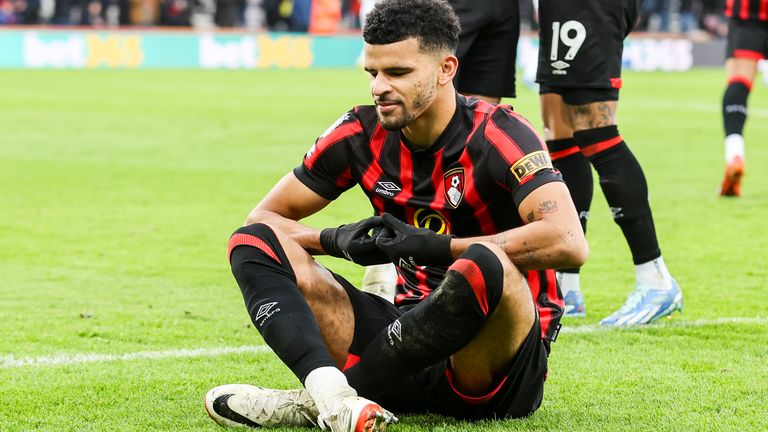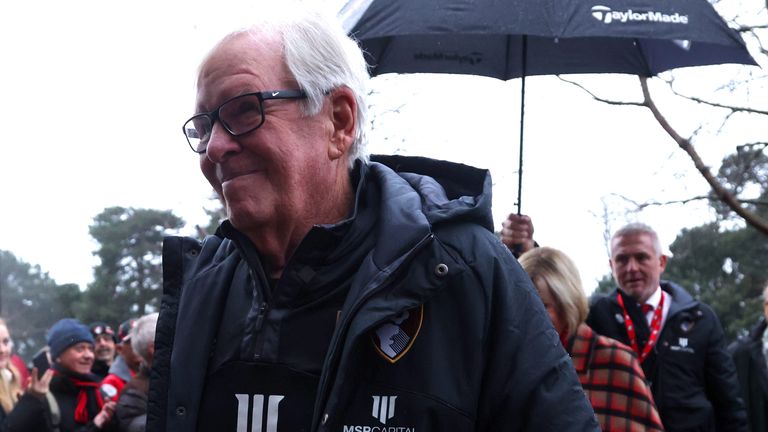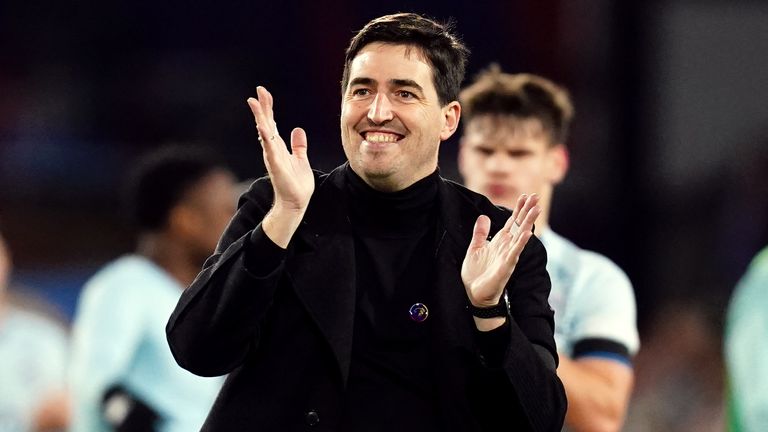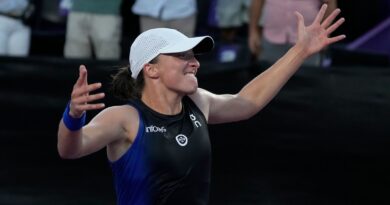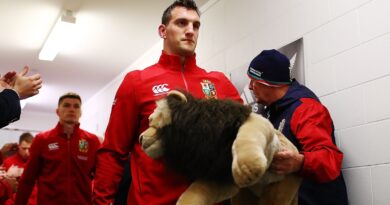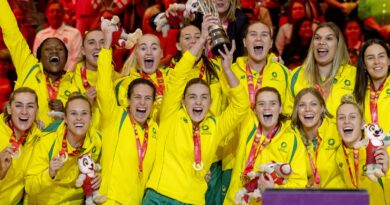Bournemouth: Andoni Iraola’s methods are finally working in Premier League but signs were there all along
Plenty of eyebrows were raised when Bournemouth comprehensively beat Manchester United 3-0 at Old Trafford last weekend. But to those who have watched the Cherries this season and particularly recently, this result was no surprise.
Even before their trip to United, Bournemouth were showing signs of significant improvement under head coach Andoni Iraola. Two wins from three games in November saw the Spaniard nominated for the Premier League’s Manager of the Month award, a prize he was ironically beaten to by Erik ten Hag.
Perhaps that fooled some into thinking this was going to be a difficult fixture for Bournemouth, who had never won at Old Trafford in their 124-year history. But the most eagle-eyed football supporters would have seen this coming. Iraola’s high-intensity tactics were always likely to trouble Ten Hag’s team. And so it proved.
Bournemouth covered more ground, made more sprints, made more intensive runs, and were far more efficient in the final third than United. They created three clear-cut chances to United’s zero, hit the target more times despite registering half as many shots, had a higher expected goals (xG) metric, and also hit the woodwork and had a goal disallowed by VAR. In truth, they were unlucky not to win by more than three goals.
Bournemouth’s purple patch
Bournemouth’s first away win at United is a magnificent achievement, but it’s also part of a bigger picture. Iraola’s side have now picked up 16 points from the previous 21 available, putting them second in the form table behind Liverpool during that period. In just six weeks they have gone from 19th and without a victory, to 14th and 10 points above the relegation zone.
As well as beating United, Bournemouth’s impressive run has included wins at Sheffield United and Crystal Palace and home victories over Burnley and Newcastle. It could have been even better had they not been denied what would have been a deserved three points over high-flying Aston Villa due to a last-minute equaliser.
Their only defeat was a 6-1 hammering at Manchester City, but as managers of much bigger clubs will tell you, that can happen to anyone.
Iraola’s struggling start still showed promise
Bournemouth decided to part ways with Gary O’Neil and appoint Iraola in the summer because they wanted to transform their style of play.
“We try to press high, to be aggressive without the ball,” Iraola, a disciple of Marcelo Bielsa, explained to Sky Sports back in May while still in charge of Rayo Vallecano, one month before his arrival on the south coast.
It’s an approach that produced immediate results at his former club but has taken slightly longer to have the same effect at Bournemouth. Even so, signs of Iraola implementing his ideas in England have been there right from day one.
Despite the Spaniard’s winless streak stretching to nine matches after a damaging 2-1 home loss to Wolves on October 21 – inflicted by ex-Cherries boss O’Neil – Bournemouth ranked ninth in the Premier League for high turnovers and seventh for shot-ending high turnovers. They were also seventh for pressed sequences and eighth for passes per defensive action (PPDA).
In a 4-2-3-1 formation, Bournemouth were also having more possession, taking more touches in the final third and opposition box, creating more chances, and increasing their expected goals (xG) tally thanks to their new-look style.
Iraola had seen enough early encouragement to persist with his philosophy. He was confident the victories would come.
Why have results improved?
Defensive solidity and controlled aggression
Bournemouth’s biggest issue was keeping the ball out of their net, but that’s no longer the case. They conceded 27 goals and kept one clean sheet in their first 11 fixtures. In the five matches since, they have conceded just three goals and kept three clean sheets.
An average of 2.45 goals shipped per game has been reduced to 0.60. That’s partly because they have cut out costly individual mistakes and are making it harder for opponents to shoot inside their box.
But perhaps the key to this defensive improvement is Bournemouth’s greater intensity and controlled aggression. On average, Iraola’s players are covering more distance, applying more pressures, and sprinting more than they did before, which has resulted in them winning more duels and tackles.
Although they have always tried to play on the front foot, they are now physically and mentally in a much better place to execute Iraola’s demanding brand of football. Positional errors were common at the start of the campaign but are rarer now, while their overall press is more co-ordinated.
This is also supported by the fact they are no longer the easiest side to play through in the Premier League. Before their first league win on October 28, Bournemouth’s defensive lines were being breached 28 times per game on average. That number has since been reduced to 18. Teams have more success against Manchester City in that sense now.
Direct attacks and final-third efficiency
A subtle shift in Bournemouth’s attacking game could also have contributed to their recent positive results. They now rank seventh in the Premier League for direct attacks having been 13th when they lost to Wolves, which suggests Iraola wants his players to spend less time on the ball in their own half.
They are also sixth for direct speed, higher than eight of the sides currently in the top half of the table, while only Everton, Sheffield United and Luton have put together fewer build-up attacks and open-play sequences of 10 or more passes.
Significantly though, Bournemouth’s efficiency in the final third has improved. During their nine-game winless run, they scored just 5.94 per cent of their shots at goal. In the seven matches that followed, that conversion rate increased to 15.63 per cent.
All this data combined suggests Bournemouth are defending better as a unit and counter-attacking more productively. They have finally got the balance right and are tactically more comfortable – but that wouldn’t have been achieved without the right personnel.
Christie and Solanke among those thriving
Bournemouth’s settled defence is largely due to the effective central partnership of Illia Zabarnyi and Marcos Senesi. Having started as Iraola’s first-choice pairing, they initially took time to gel but have now begun five consecutive games together and are growing in confidence every week.
On either side of the Ukraine and Argentina internationals at full-back, Adam Smith, Max Aarons, Milos Kerkez and Lloyd Kelly have all shown at times throughout the season they have the athleticism and tactical nous to succeed in their head coach’s system.
Then there’s the positional change of Ryan Christie in midfield – which has proven to be an Iraola masterstroke. The Scot, who usually plays as a No 10, was deployed in a deeper role against Newcastle before the November international break and has been instrumental ever since.
Dictating from deep, winning tackles and starting phases of play, Christie’s new position has set the platform for everything else to succeed around him and appears to have unlocked Bournemouth’s potential under Iraola, who back in October described the 28-year-old as “the most tactically intuitive player I have in the squad”.
Central midfielders are key to Iraola’s plan working and alongside Christie, Lewis Cook has been magnificent. Manchester United could not live with the intensity of Bournemouth’s pressing last weekend and Cook epitomised that. In total, he regained possession 16 times – the joint-most by any player in any Premier League game all season.
Cook set up Dominic Solanke‘s opener at Old Trafford and the ex-Liverpool striker’s performances are another key reason for Bournemouth’s climb up the table.
Solanke has found the net eight times in the Premier League this term, already his best goalscoring season in the top flight. He is in the form of his life and has been supported by an exciting group of attacking players including Justin Kluivert, Marcus Tavernier and Antoine Semenyo.
Foley deserves credit for backing Iraola
Iraola’s start at Bournemouth was a nightmare, particularly considering it was his first job in the Premier League and he was already under pressure to perform following the harsh sacking of his predecessor.
The writing appeared to be on the wall after O’Neil’s winning return to the south coast, even if Bournemouth’s games across the first two months of the season had been ranked by Opta as the toughest in the Premier League. There were reports a defeat by Burnley the following weekend would be the end of the road for Iraola, but a maiden league win gave him some much-needed respite.
Patience is rarely given in football these days, so that’s why Bournemouth owner Bill Foley deserves credit. The American businessman, who flew over to watch the Burnley game in person, backed Iraola with nine signings in the summer transfer window for a combined £117.3m and could have quite easily panicked when there were no immediate signs of progress.
‘Iraola ball’ is just beginning
The Burnley result looks to have been the turning point in Bournemouth’s season, but Iraola’s players have always been on board with his big-risk, big-reward philosophy. “We knew it would come together,” said a convinced Antoine Semenyo in the days before that famous victory over Manchester United.
Crucially, the fans are behind Iraola too. The Spaniard’s name has been chanted passionately up and down the country in recent weeks, but the history-making result at Old Trafford – described by Adam Smith as Bournemouth’s “best-ever Premier League win” – was the biggest indication yet that there is a clear plan and vision.
Perhaps it was foolish to doubt Iraola in the first place. After all, this is a man who not only got Rayo Vallecano promoted to LaLiga at the first attempt, but then secured consecutive mid-table finishes and beat Real Madrid and Barcelona last season.
He has also shown he has what it takes to engineer a necessary turnaround. Spanish side Mirandes – his second club in management – won just one of his first 10 games in charge before recovering to record their highest league finish in five years.
While his work at Bournemouth has gone slightly under the radar so far, it will not stay that way for long. With key first-team players still to return from injury and more signings undoubtedly on the way, ‘Iraola ball’ is only going to get better.
Follow Bournemouth vs Luton on Sky Sports’ digital platforms from 1.30pm on Saturday and watch free highlights from 5.15pm.

